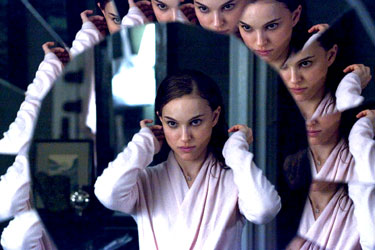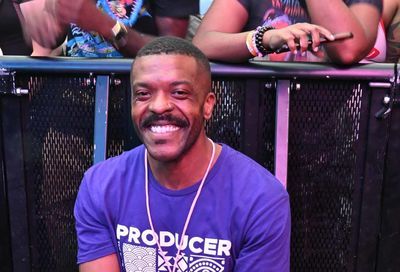Lake Effect
Even when things are most their most bizarre and confusing, Darren Aronofsky's Black Swan is gripping and stunning
It may seem strange to trade in the professional wrestling ring for ballet shoes, but that’s just what director Darren Aronofsky has done. Don’t worry, though, you can still enjoy Black Swan even if you don’t know an arabesque from a cabriole.

Black Swan
(Photo by Niko Tavernise)
In The Wrestler, Aronofsky explored the soul of a washed-up man and the darkness that threatened to overtake him. In Black Swan, he explores the mind of a dancer and the darkness that lies within. Nina (Natalie Portman) is on the verge of a major breakout. Having languished in the background of a ballet company in New York for years, the forced retirement of the lead dancer (Winona Ryder) provides an opening for Nina to take center stage in an upcoming production of Swan Lake. Her biggest challenge will be dancing the role of the Black Swan, a sultry, seductive part that just might be too sexy for the uptight, perfectionist. Adding additional pressure is her biggest critic — her controlling mother (Barbara Hershey).
Stalking Nina’s every move, like a cat hunting a swan, is Lily (Mila Kunis), a new dancer in the company who is Nina’s polar opposite. Aronofsky hammers this point home in countless ways, including the glaringly obvious choice of dressing Nina in white and Lily in black. Lily unleashes a bit of Nina’s inner wild child, but their friendship is tinged with rivalry and paranoia.
For a good portion of the film, the central conflict in the script, co-written by Mark Heyman, Andres Heinz and John McLaughlin, is unclear. As it turns out, it’s not just the story of a production of Swan Lake, it’s also the story of Swan Lake. The main narrative thrust — will Nina will tap into her primal urges and learn to dance the role of the Black Swan before Lily can steal the part away from her — is fairly banal. If we wanted to see that, we could just watch the decade-old Center Stage. But there are just enough hints at something darker, possibly supernatural, to know that something more is at play. As the story builds to a climax, the question of ”What exactly is going on?” transforms to ”What the fuck is going on?”
Aronofsky teeters on the edge between creepy and melodramatic. Done with less skill and vision the film would have spiraled out of control, crashing and burning on the stage. While several of the scenes provoke a grin when one wasn’t intended, for the most part Aronofsky creates a thoroughly warped and twisted world for Nina. Fortunately for him, Portman’s performance is so utterly compelling that she makes this world believable.
At first a willowy, wispy dancer too afraid to stand up for herself, Nina evolves into a darker version of herself, hell-bent on protecting her reign as the Swan Queen. Portman bares it all in the role; though almost emaciated, every muscle ripples as she dances across the stage again and again. Even under Nina’s fearful exterior, Portman conveys an inner strength waiting to erupt. This is most evident when she’s playing opposite Hershey, who is one part “Mommie, Dearest,” one part Patsy Ramsey, and one part the mother from Flowers in the Attic. Hershey’s performance makes this stage mom both sympathetic and pathetic.
As Lily, the ultimate ”frenemy” to Nina, Kunis has a critical role to play. She’s at once the catalyst for Nina’s emotional crisis and also its foil. In an otherwise dark and dreary story, Lily is the one consistent point of humor and levity. She’s a breath of fresh air when Nina’s tiny existence becomes overwhelming. Yet Kunis brings malice to the part that calls into question every move that Lily makes. She epitomizes the phrase, ”Just because you’re paranoid doesn’t mean they aren’t out to get you.”




Starring
Natalie Portman,
Mila Kunis
Rated R
107 Minutes
Opens Friday,
Dec. 3
Area Theaters
In an all-too-brief role, Ryder deserves her own curtain call. As a washed-up ballerina being danced off the stage, she’s a portent of things to come for Nina. Ryder revels in the part, taking it to an extreme that blends perfectly with the rest of the film.
Even when things are most bizarre and confusing, Black Swan is gripping and stunning. The numerous ballet sequences are beautiful. Aronofsky crashes through the fourth wall that usually divides the audience from the performers to capture the fluid nature of the dance moves and the harsh reality of its toil on the body. He employs techniques to embrace his audience, employing a documentary style to draw us closer to Nina, or close-ups to make even a simple task like cutting nails almost unbearable to watch. Also, like ballet, Aronofsky uses the music to tell its own story, a driving crescendo to the finale.
Though it takes a long time to realize the promise of Black Swan, the final act makes it all worthwhile. Even as you’re shaking your head trying to piece it all together, you find yourself on your feet, clapping wildly and calling for an encore.
Support Metro Weekly’s Journalism
These are challenging times for news organizations. And yet it’s crucial we stay active and provide vital resources and information to both our local readers and the world. So won’t you please take a moment and consider supporting Metro Weekly with a membership? For as little as $5 a month, you can help ensure Metro Weekly magazine and MetroWeekly.com remain free, viable resources as we provide the best, most diverse, culturally-resonant LGBTQ coverage in both the D.C. region and around the world. Memberships come with exclusive perks and discounts, your own personal digital delivery of each week’s magazine (and an archive), access to our Member's Lounge when it launches this fall, and exclusive members-only items like Metro Weekly Membership Mugs and Tote Bags! Check out all our membership levels here and please join us today!























